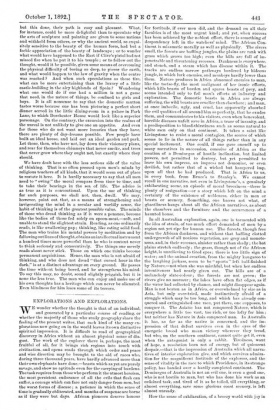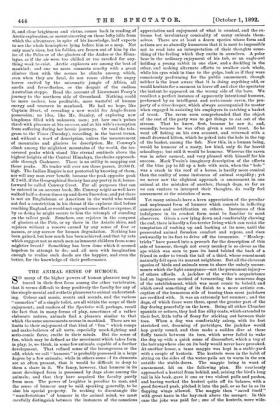EXPLORATIONS AND EXPLORATIONS.
WE wonder whether the thought is that of an individual, and generated by a particular course of reading, or whether the majority of those who study geography share the feeling of the present writer, that each kind of the many ex- plorations now going on in the world leaves its own distinctive spiritual impression. It is difficult to read of geographical discovery in Africa without an almost physical sense of dis- gust. The work of the explorer there is, perhaps, the most fruitful of all, for it brings rich regions into touch with civilisation, and opens roads through which order and peace and wise direction may be brought to the aid of races who, during three thousand years, have hardly advanced more than their own elephants have done,—beasts which as yet are purely savage, and show no aptitude even for the carrying of burdens. The task requires from those who perform it the utmost heroism, the most persistent endurance of all the evils that flesh can suffer, a courage which can face not only danger from men, but the worst forms of disease ; a patience in which the sense of ti me is gradually obliterated, and months of suspense are borne as if they were but days. African pioneers deserve honour
for fortitude, if ever men did, and the demand on all their faculties is of the most urgent kind; and yet, when success has been achieved by the noblest effort, there is something of despondency left in the watchers' mind. The African Con- tinent is miasmatic morally as well as physically. The rivers smell, the forests are baffling jungles, the plains are rank with grass which grows too high ; even the hills are full of im- penetrable and threatening recesses. Dankness is everywhere, and stench, and a steam which has disease within it. The tracks are endless narrow pathways bordered by hideous jungle, in which lurk enemies, and monkeys hardly lower than them. Nature produces in Africa abnormal enemies to man, like the tsetse-fly, the most malignant of her ironic efforts, which kills beasts of burden and spares beasts of prey, and seems intended only to foil man's efforts at industry and exploration. The domestic beasts in Africa are always suffering, the wild beasts are crueller than elsewhere ; and man, at once imbecile, ugly, and cruel, has apparently absorbed the evil qualities of all around him so perfectly, that he exudes them, and communicates to his visitors, even when benevolent, horrible diseases unfelt save in Africa, a trace of insanity, and a predisposition to blood-thirstiness such as seems natural to white men only on that continent. It takes a saint like Livingstone to resist a moral contagion, the source of which seems to lie in the nature of all things rather than in any special incitement. One could, if one gave oneself up to many narratives in succession, conceive of Africa as the creation of a Demiurgus of hostile inclination, but limited powers, not permitted to destroy, but yet permitted to leave his own impress, an impress not demoniac, or even devilish, but rather that of a wicked but hampered imp, upon all that he had produced. That is Africa to us, in every book, from Bruce's to Stanley's. We cannot recall in one narrative, not even in Livingstone's, a genuinely exhilarating scene, an episode of moral breeziness—there is plenty of resignation—or a story which left on the mind a certainty of the existence of nobleness, either in men or beasts or scenery. Something, one knows not what, of ghastliness hangs about all the African narratives, as about the chambers and the furniture and the occurrences of a haunted house.
In all Australian exploration, again, one is tormented with the idea of strain, of too much effort demanded of men by a region not yet ripe for human use. The forests, though free from the African dankness, and without that baffling clotted undergrowth of all noxious vegetation, are grey and monoto- nous, and, in their recesses, sinister rather than shady ; the hot plains stretch endlessly ; the grass, though not of the African height, is unrelieving to tired eyes ; there is too little sign of water ; and the animal creation, from the mighty kangaroo to the laughing jackass, seem to be " sports " left half-finished by Nature,—not when she was mirthful, but when her endless inventiveness had nearly given out. The hills are of a melancholy slate-colour; the forests are not green ; the rivers give no murmur ; the lakes have often flat edges, as if the water had collected by chance, and might disappear again. Man is not beaten as in Africa, or overwhelmed by size as in Asia, but only over-tried, made instinctively afraid of a struggle which may be too long, and which has already con- quered and extinguished one race, put there, one supposes, to conquer it. The Asiatic has not conquered Nature, which is everywhere a little too vast, too rich, or too lofty for him ; but neither has Nature in Asia conquered man. In Australia it has, as far as the native is concerned, and the im- pression of that defeat survives even in the eyes of the energetic brood who mean victory wherever they tread, but who, on the southern continent, cannot quite get it, even when the antagonist is only a rabbit. Tiredness, want of hope, a resolution born not of energy, but of quiescent despair,—that is the impression of Australia which all narra- tives of interior exploration give, and which survives admira- tion for the magnificent fortitude of the explorers, and the sense of vitality in the race to which Providence, in its strange policy, has handed over a hardly completed continent. The Demiurgus of Australia is not an evil one, is even a good one, who is not hostile to man, but who has done his work as an ordained task, and tired of it as he toiled, till everything, or almost everything, save some glorious coast scenery, is left almost unready.
How the sense of exhilaration, of a breezy world with joy in
it, and clear brightness and virtue, comes back in reading of Arctic exploration, or mountaineering on those lofty hills from which the adventurer, in spite of his knowledge, half expects to see the whole hemisphere lying before him as a map. Not only man's vices, but his foibles, are frozen out of him by the ice of the Poles or of the glaciers of the Andes or the Hima- layas, as if the air were too chilled or too rarefied for any- thing weak to exist. Arctic explorers are among the best of mankind ; and one no more connects cruelty with a great climber than with the scenes he climbs among, which, even when they are fatal, do not rouse either the angry horror excited by the miasmatic jungle of Africa, all smells and fever-flushes, or the despair of the endless Australian steppe. Read the account of Lieutenant Peary's journey to the northern side of Greenland. Nothing could be more useless, less profitable, more wasteful of human energy and resource in manhood. He had no hope, like Captain Sturt, of revealing a new world for Anglo-Saxon possession ; no idea, like Mr. Stanley, of exploring new kingdoms filled with unknown men ; yet how one's pulses throb with pleasure at his success, and at his wife's exemption from suffering during her heroic journeys. Or read the tele- gram to the Times (Tuesday), recording, in the barest terms, and without a word of description, unless the measurement of mountains and glaciers be description, Mr. Conway's climb among the mightiest mountains of the world, the ice- covered peaks which stand like eternal sentinels above the highest heights of the Central Himalaya, the chains approach- able through Cashmere. There is no utility in mapping out those peaks. No trader will ever use those passes, 20,000 ft. high. The Indian Empire is not protected by knowing of them, nor will any man ever benefit because the peak opposite peak K 2 will, if the Geographical Society has any poetry in it, hence- forward be called Conway Crest. For all purposes that can be entered in an account book, Mr. Conway might as well have walked half-a-dozen times up and down Snowdon; and yet there is not an Englishman or American in the world who would not feel a constriction in his throat if the explorer died before reaching England, or would not expend some effort or expense, if by so doing he might secure to him the triumph of standing on the tallest peak. Somehow, one rejoices in the conquest of glaciers at the Pole, or up there in the Asiatic skies, and rejoices without a reserve caused by any sense of fear or nausea, or any sorrow for human degradation. Nothing has been gained, but bow much has been achieved, and that by acts which suggest not so much men as innocent children from some mightier breed ? Something has been done which it seemed hopeless to attempt to do; and all men with imagination enough to realise such deeds are the happier, and even the better, for the knowledge of their performance.



































 Previous page
Previous page